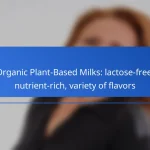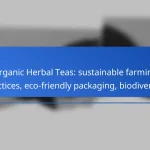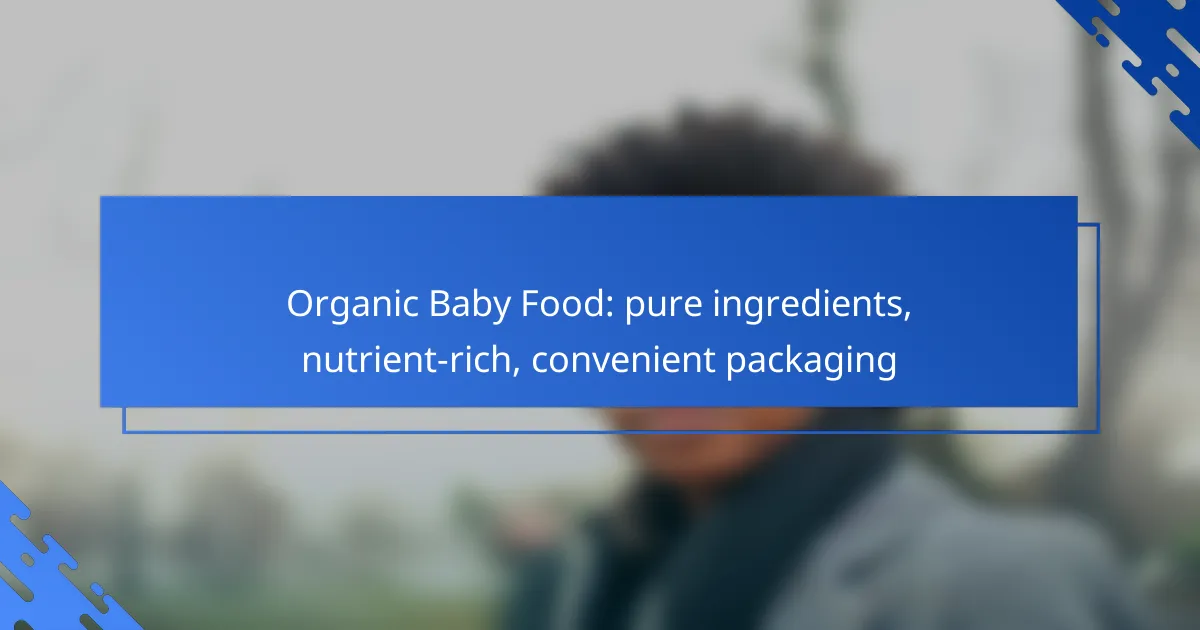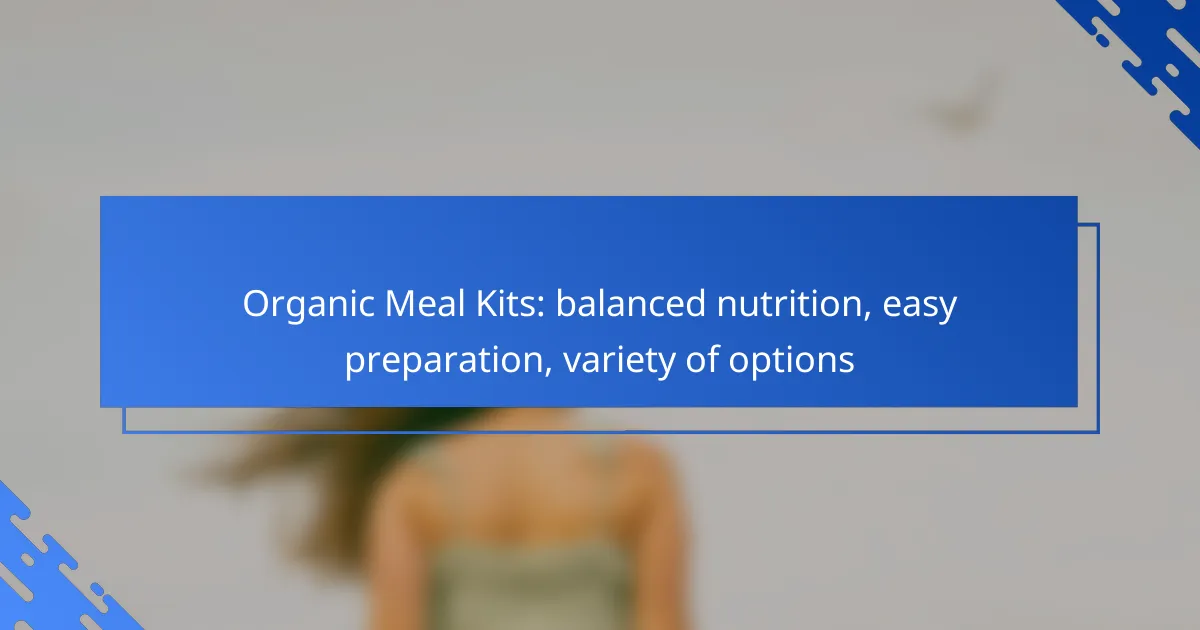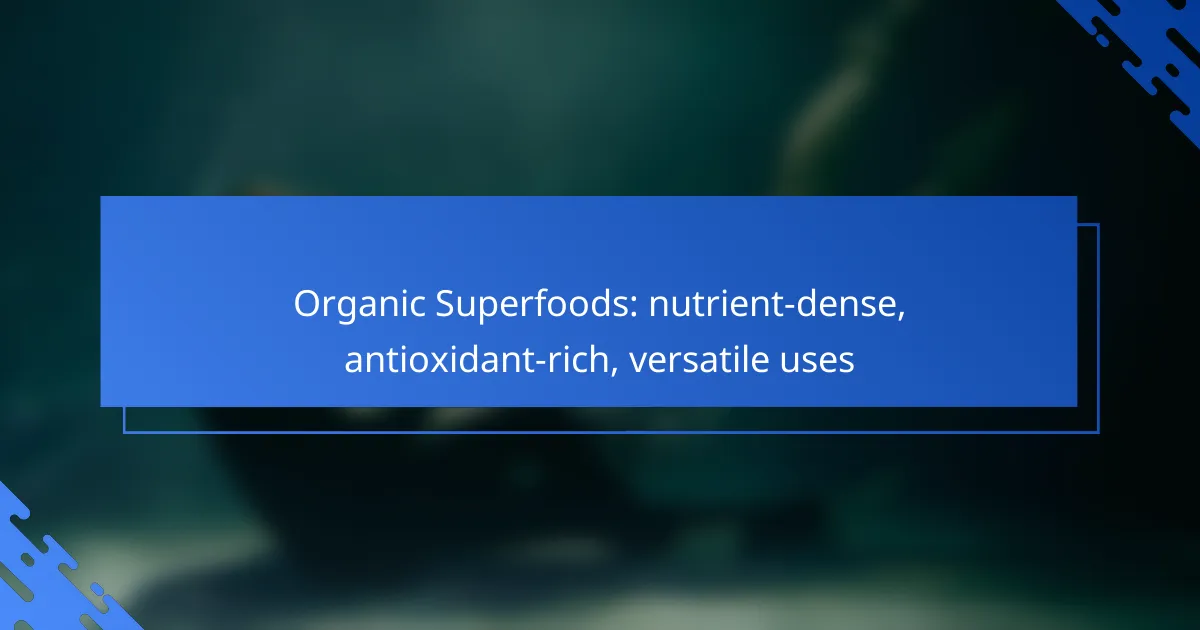Organic baby food is designed with pure ingredients and nutrient-rich formulations, providing a healthy start for your little one. With a focus on quality and safety, these products ensure that parents can trust the food they offer. Additionally, convenient packaging makes it easier to provide wholesome nutrition without compromising on standards.
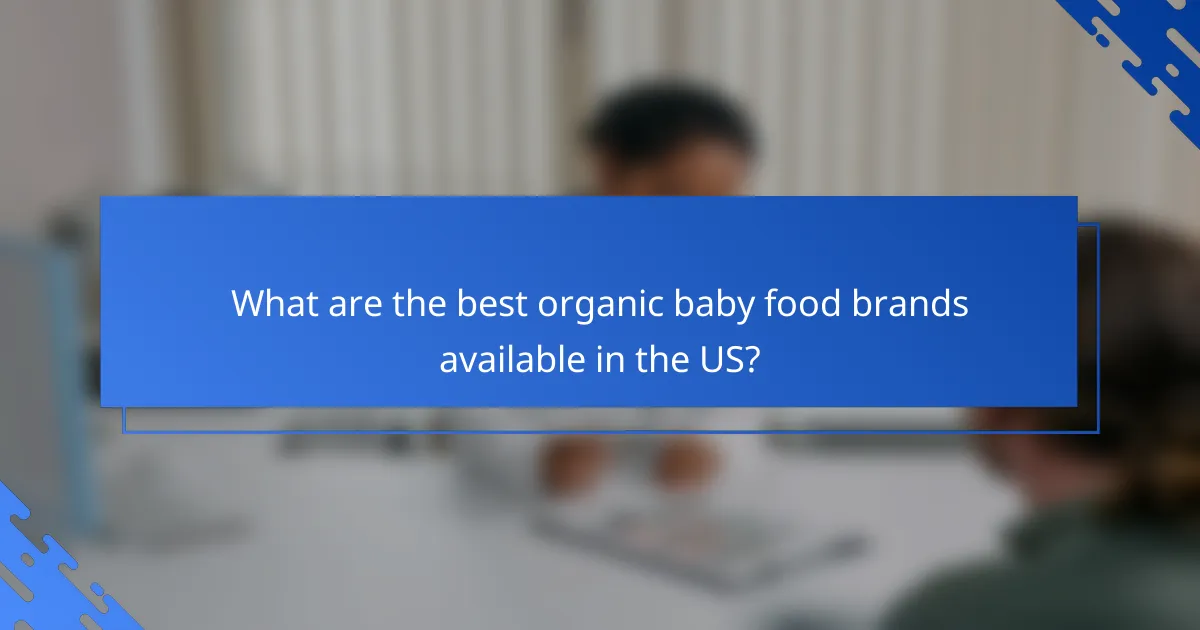
What are the best organic baby food brands available in the US?
The best organic baby food brands in the US focus on pure ingredients, nutrient-rich formulations, and convenient packaging. These brands prioritize quality and safety, ensuring parents can trust the food they provide to their babies.
Happy Baby Organics
Happy Baby Organics offers a wide range of organic baby food products, including purees, snacks, and cereals. Their ingredients are sourced from trusted farms, and they emphasize transparency in their labeling, making it easy for parents to understand what they are feeding their children.
They also provide a variety of flavors and textures, catering to different stages of a baby’s development. Happy Baby Organics often uses innovative packaging that is both convenient and environmentally friendly.
Earth’s Best Organic
Earth’s Best Organic is known for its commitment to high-quality organic ingredients, free from artificial preservatives and additives. They offer a selection of baby food jars, pouches, and snacks that are USDA-certified organic.
This brand focuses on providing wholesome nutrition, with many products featuring a mix of fruits, vegetables, and whole grains. Parents appreciate their dedication to sustainability and eco-friendly practices in sourcing and packaging.
Beech-Nut Organic
Beech-Nut Organic prides itself on using real food ingredients without artificial flavors or preservatives. Their baby food products are minimally processed, which helps retain the natural nutrients and flavors of the ingredients.
The brand offers a variety of purees and meals that are easy for babies to digest. Beech-Nut’s clear labeling and commitment to transparency make it a popular choice among health-conscious parents.
Plum Organics
Plum Organics specializes in organic baby food pouches that are convenient for on-the-go feeding. Their products include a variety of fruit and vegetable blends, as well as meals designed for older babies and toddlers.
They focus on using high-quality, organic ingredients and often incorporate superfoods to enhance nutritional value. Plum Organics is also known for its commitment to sustainability in both sourcing and packaging.
Little Spoon
Little Spoon offers fresh, organic baby food that is made to order and delivered directly to your home. Their meals are crafted by pediatricians and nutritionists, ensuring that they meet the nutritional needs of growing babies.
With a focus on seasonal ingredients, Little Spoon provides a rotating menu that keeps mealtime exciting. Their packaging is designed for convenience, making it easy for parents to serve healthy meals quickly.
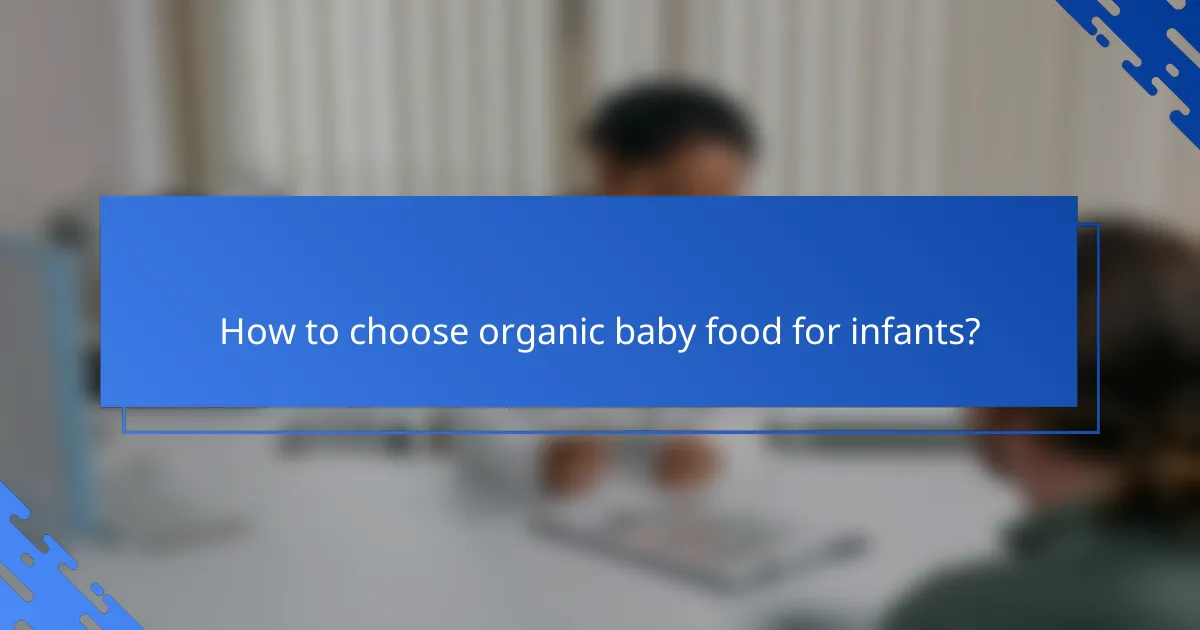
How to choose organic baby food for infants?
Choosing organic baby food for infants involves selecting products that meet specific standards for purity and nutrition. Focus on certifications, ingredient quality, and nutrient content to ensure your baby receives the best possible start.
Check for USDA certification
USDA certification guarantees that the baby food meets strict organic standards. Look for the USDA Organic seal on packaging, which indicates that the ingredients are grown without synthetic pesticides, fertilizers, or genetically modified organisms.
When shopping, prioritize brands that prominently display this certification. This not only ensures quality but also supports sustainable farming practices that benefit the environment.
Look for pure ingredients
Pure ingredients are essential for organic baby food, as they minimize exposure to harmful additives. Check the ingredient list for whole foods like fruits, vegetables, and grains without fillers or artificial preservatives.
Avoid products with long ingredient lists or those containing unfamiliar additives. Simple combinations, such as pureed peas or apples, are often the best choices for infants.
Consider nutrient density
Nutrient density refers to the amount of essential vitamins and minerals in relation to the calories in the food. Choose baby foods that are rich in nutrients to support your infant’s growth and development.
Look for options that include a variety of vegetables, fruits, and whole grains. Foods high in iron, calcium, and vitamins A and C are particularly beneficial. Reading nutrition labels can help you compare the nutrient content of different products effectively.

What are the benefits of organic baby food?
Organic baby food offers several advantages, including being free from harmful chemicals, containing higher nutrient levels, and promoting environmental sustainability. Parents often choose organic options to ensure their infants receive the best nutrition without exposure to pesticides or artificial additives.
Free from harmful pesticides
Organic baby food is produced without the use of synthetic pesticides, herbicides, or fertilizers. This means that the ingredients are less likely to contain harmful residues that could affect a baby’s health. Choosing certified organic products ensures compliance with strict agricultural standards that prioritize safety.
When shopping for organic baby food, look for labels that indicate USDA Organic certification or equivalent standards in your country. This guarantees that the food has been grown and processed according to specific regulations designed to protect consumers.
Higher nutrient content
Many studies suggest that organic baby food may have a higher nutrient content compared to conventional options. Organic fruits and vegetables are often grown in healthier soil, which can lead to richer flavors and increased levels of vitamins and minerals. This is particularly important for infants who require optimal nutrition for growth and development.
When selecting organic baby food, consider options that highlight specific nutrients, such as iron or omega-3 fatty acids, which are crucial for brain development. Reading labels can help you choose products that meet your baby’s dietary needs.
Better for the environment
Organic farming practices are designed to be more sustainable and environmentally friendly. By avoiding synthetic chemicals, organic agriculture helps preserve biodiversity, improve soil health, and reduce pollution. This approach contributes to a healthier ecosystem, which benefits future generations.
Supporting organic baby food brands can also promote ethical farming practices. Many organic producers focus on animal welfare and sustainable sourcing, making it a more conscientious choice for environmentally aware parents.
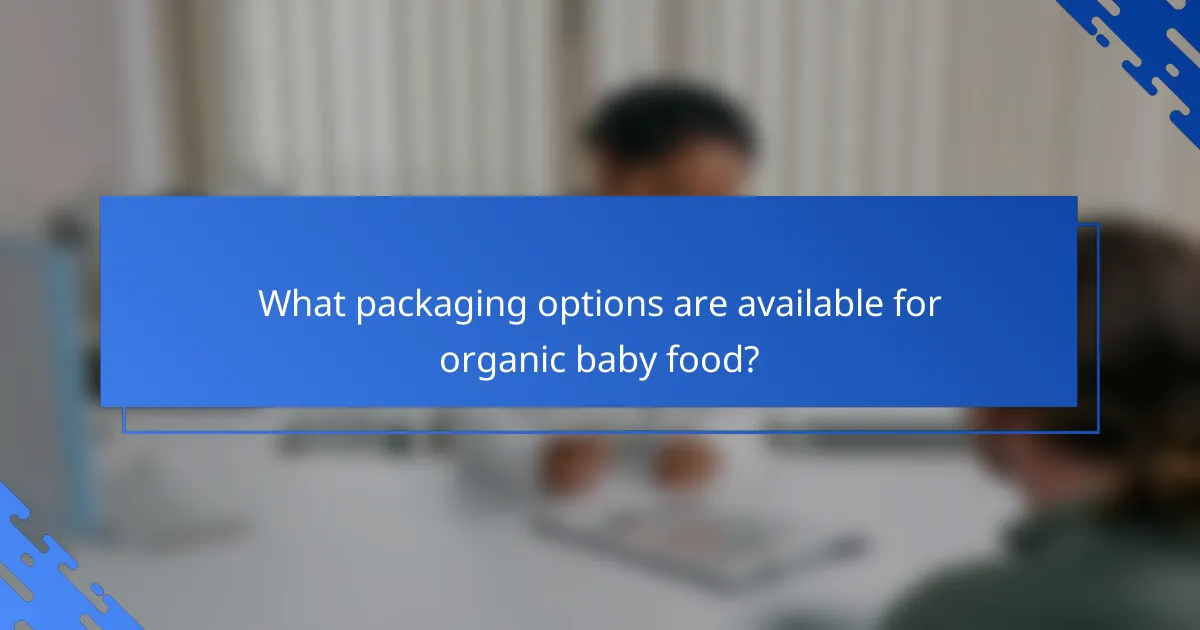
What packaging options are available for organic baby food?
Organic baby food comes in several convenient packaging options that cater to different needs and preferences. The most common types include glass jars, pouches, and reusable containers, each offering unique benefits for parents and caregivers.
Glass jars
Glass jars are a traditional packaging option for organic baby food, known for their durability and ability to preserve freshness. They are typically made from non-toxic materials and are recyclable, making them an eco-friendly choice.
When using glass jars, consider that they can be heavier and more fragile than other options. They are ideal for home storage or when you want to serve larger portions, as they often come in various sizes, from small to large.
Pouches
Pouches have gained popularity due to their convenience and portability. They are lightweight, easy to carry, and often feature resealable tops, making them perfect for on-the-go feeding.
However, it’s essential to check for BPA-free materials and ensure the pouches are recyclable. Many brands offer a variety of flavors and combinations, allowing for a diverse diet for your baby.
Reusable containers
Reusable containers provide a flexible option for storing homemade or store-bought organic baby food. These containers come in various sizes and materials, such as silicone or BPA-free plastic, allowing you to portion meals easily.
When using reusable containers, ensure they are dishwasher and microwave safe for added convenience. This option is cost-effective in the long run and reduces waste, making it a sustainable choice for environmentally conscious parents.
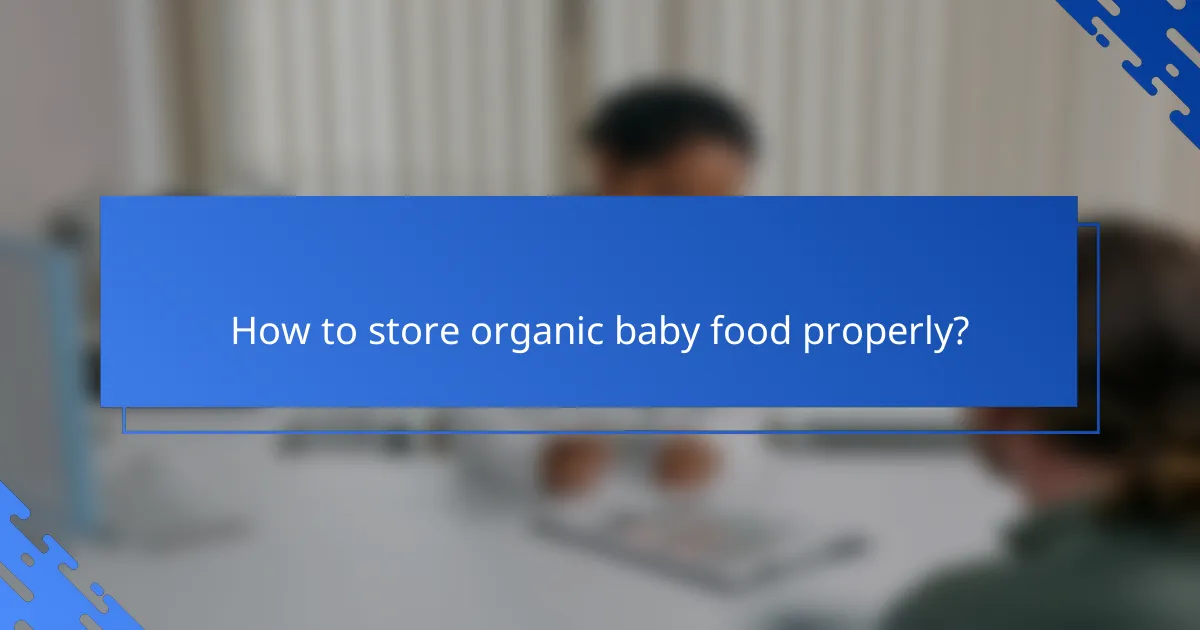
How to store organic baby food properly?
To store organic baby food properly, it’s essential to keep it in a cool environment and follow specific guidelines after opening. Proper storage helps maintain freshness and nutritional value, ensuring your baby receives the best ingredients.
Refrigerate after opening
Once you open a jar or pouch of organic baby food, refrigerate it immediately to prevent spoilage. Most opened baby food can last in the refrigerator for about 3 to 5 days, but always check for any signs of spoilage before feeding.
Store the baby food in an airtight container to minimize exposure to air and moisture, which can lead to bacterial growth. If you notice any changes in color, texture, or smell, discard the food to ensure your baby’s safety.
Freeze for long-term storage
Freezing organic baby food is an excellent option for long-term storage, allowing you to keep it for several months. Portion the food into small containers or ice cube trays, and once frozen, transfer the cubes to a freezer-safe bag for easy access.
Label the containers with the date and type of food to keep track of freshness. Generally, frozen baby food can last up to 3 to 6 months in the freezer, but it’s best to use it within the first few months for optimal taste and nutrition.

What are the common ingredients in organic baby food?
Organic baby food typically includes pure, natural ingredients that are free from synthetic additives and pesticides. Common components focus on providing essential nutrients while ensuring safety and digestibility for infants.
Fruits and vegetables
Fruits and vegetables are foundational ingredients in organic baby food, offering vitamins, minerals, and fiber. Common choices include apples, pears, sweet potatoes, and carrots, which are often pureed for easy consumption.
When selecting organic baby food, look for options that list whole fruits or vegetables as the first ingredient. Avoid products with added sugars or preservatives, as these can detract from the nutritional value.
Whole grains
Whole grains provide essential carbohydrates and nutrients, making them a valuable addition to organic baby food. Options like brown rice, oats, and quinoa are frequently used, offering a source of energy and fiber.
When choosing whole grain products, ensure they are labeled organic and free from artificial ingredients. Mixing whole grains with fruits or vegetables can enhance flavor and nutrition, creating a balanced meal for your baby.
